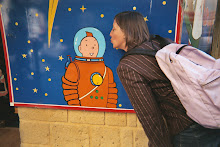
First of all, what if he doesn’t like fish, but prefers goat? Secondly, perhaps he catches a fish and brings it home, but he must sell it for school fees for his children or for malaria meds for his sick baby. Then what?!
Being upcountry, I’m thinking a lot more about the poor because they are all around me. John Baptiste and Emile told me that the police recently stopped them at a checkpoint asking them to take two young girls with them when they were traveling upcountry. The girls were far from home visiting their mother in a local hospital. They learned that instead of going to school, these two girls work in the field because they are too poor to pay school fees. Per capita income is less than a $1 US per month in this area while nationally it’s about $2 US per week.
So why are they poor? Why haven’t things changed much since I was in
I don’t really have the answers to a lot of my questions, but I do know that the Child Survival Project that I’ve joined is a step toward righting some social injustices and toward placing structures in place that will last. This week we’ve been training promoters on our first health intervention (diarrhea, of course!). These promoters will train volunteers who will fan out in their communities with these health messages (including malaria, immunizations and malnutrition). If you know about my public health passion, you know I strongly believe in collaborating with the local Ministry of Health (MoH) in order to sustain the project. This project has included various specialists from the MoH in the training, and part of my job is to make sure we are sharing critical health indicators and data. The plan is for the MoH to continue the project on their own after five years and to use it as a template for other provinces. It was a good week for me to get familiar with where I’ll be working for the rest of my time here and for building relationships with the promoters.



2 comments:
Dear Beth. You sound well but your compassion for Burnundi is layered with concern. Your eyes-wide-open accounts affect me to and I am glad you are helping. Take care, love, MMM
Hi Beth,
Excellent questions! You're helping out in a concrete way.
We're back in Germany. So good to see Gaby and Josiah in Oregon!
Danielle arrived yesterday, after gnashing her teeth over a bag lost (hope they deliver today) and a re-route through Heathrow. Guess you can empathize...
love you,
Laurie
Post a Comment